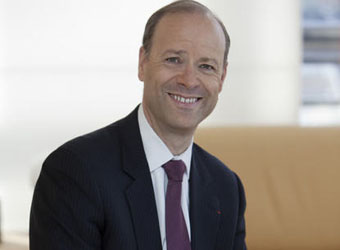Sanofi cut its full-year forecast as second-quarter profit missed analysts’ estimates, hurt by inventory mismanagement in Brazil and generic competition.
Earnings per share excluding some costs and currency swings may fall as much as 10 percent, France’s largest drugmaker said in a statement. Sanofi previously expected profit to show no change or drop 5 percent at worst. The stock slid as much as 6.3 percent, the most in almost two years.
Chief Executive Officer Chris Viehbacher said today he continues to expect a return to growth in the second half. Last quarter’s 23 percent earnings decline reflected generic competition to some of the company’s best-selling medicines and underperformance at several units, including the one that sells generic drugs in Brazil.
“We have hit a few speed bumps,” Viehbacher said on a call with reporters today. “There’s probably no point sugar-coating this.”
Sanofi fell 5.1 percent to 76.06 euros at 9:07 a.m. in Paris. The earlier decline of 6.3 percent was the steepest since Aug. 10, 2011. The shares have returned 16 percent in the past year, including reinvested dividends, trailing a 19 percent return in the Bloomberg Europe Pharmaceutical Index.
Brazil Trouble
The Paris-based company took two charges totaling 201 million euros ($267 million) because inventory at customers in Brazil was “significantly and inappropriately” higher than necessary. Sanofi has recalled some stock that is expiring and appointed new management, Viehbacher said. “This was a bad management practice,” he said.
At the same time, sales of new drugs failed to make up for generic competition for brand-name medicines including the blood thinner Lovenox and the cancer drug Eloxatin, which lost patent protection a year ago.
Second-quarter profit excluding some costs fell to 1.48 billion euros, or 1.11 euros a share, from 1.93 billion euros, or 1.46 euros, a year earlier. That missed the average analyst forecast for profit of 1.74 billion euros among 12 estimates compiled by Bloomberg.
Revenue slipped 9.8 percent to 8 billion euros last quarter, also missing analyst estimates.
Sales of the diabetes drug Lantus climbed 18 percent in constant currencies to 1.41 billion euros, while revenue from the Genzyme unit, which sells treatments for rare genetic diseases, jumped 26 percent in constant currencies to 525 million euros.
’Buying Opportunity’
Still, the loss of patent exclusivity on drugs such as Lovenox and the blood pressure medicine Aprovel wiped out 1.04 billion euros of sales during the first half, Sanofi (SAN) said. Sales of vaccines and animal health drugs also fell. The company forecast in May that cheaper copies of its medicines would probably lead to a total of 800 million euros in lost profit in the first half.
The company has also experienced setbacks in its efforts to bring new drugs to market. Sanofi terminated development of the lung-cancer drug iniparib and an anti-coagulant known as otamixaban last month after both drugs failed in studies.
While the second-quarter performance is “disappointing,” the one-off nature of the Brazil problem and the fact that Sanofi is now over most of the patent cliff means future quarters will be more favorable, said Jeffrey Holford, an analyst at Jefferies International Ltd. in New York.
“This may be the last great buying opportunity on Sanofi before the rebound,” Holford wrote in a note today.
More Acquisitions
Sanofi continues to seek bolt-on acquisitions of about 1 to 2 billion euros per year, Viehbacher said today, declining to comment on any particular targets. The company is looking primarily for deals in emerging markets, non-prescription products and branded generics, Viehbacher said.
“There’s an awful lot of things out there in the market where given the high price of them it’s pretty easy to make someone else’s shareholders wealthy, but it’s not so obvious how you make a beneficial difference to Sanofi shareholders,” he said. “It’s a lot tougher to find value-enhancing deals at the moment.”
Viehbacher said local authorities in China visited a regional office, though the company didn’t know what the purpose of the inspection was. Sanofi’s China headquarters in Shanghai haven’t been checked, he said.
Chinese authorities have accused Sanofi’s rival GlaxoSmithKline Plc of economic crimes amounting to 3 billion yuan ($489 million) in spurious travel and meeting expenses as well as trade in sexual favours that were conducted through a travel agency it used. Sanofi said last week it had used the same travel agency but stopped when the allegations of wrongdoing surfaced.
Source: Bloomberg



